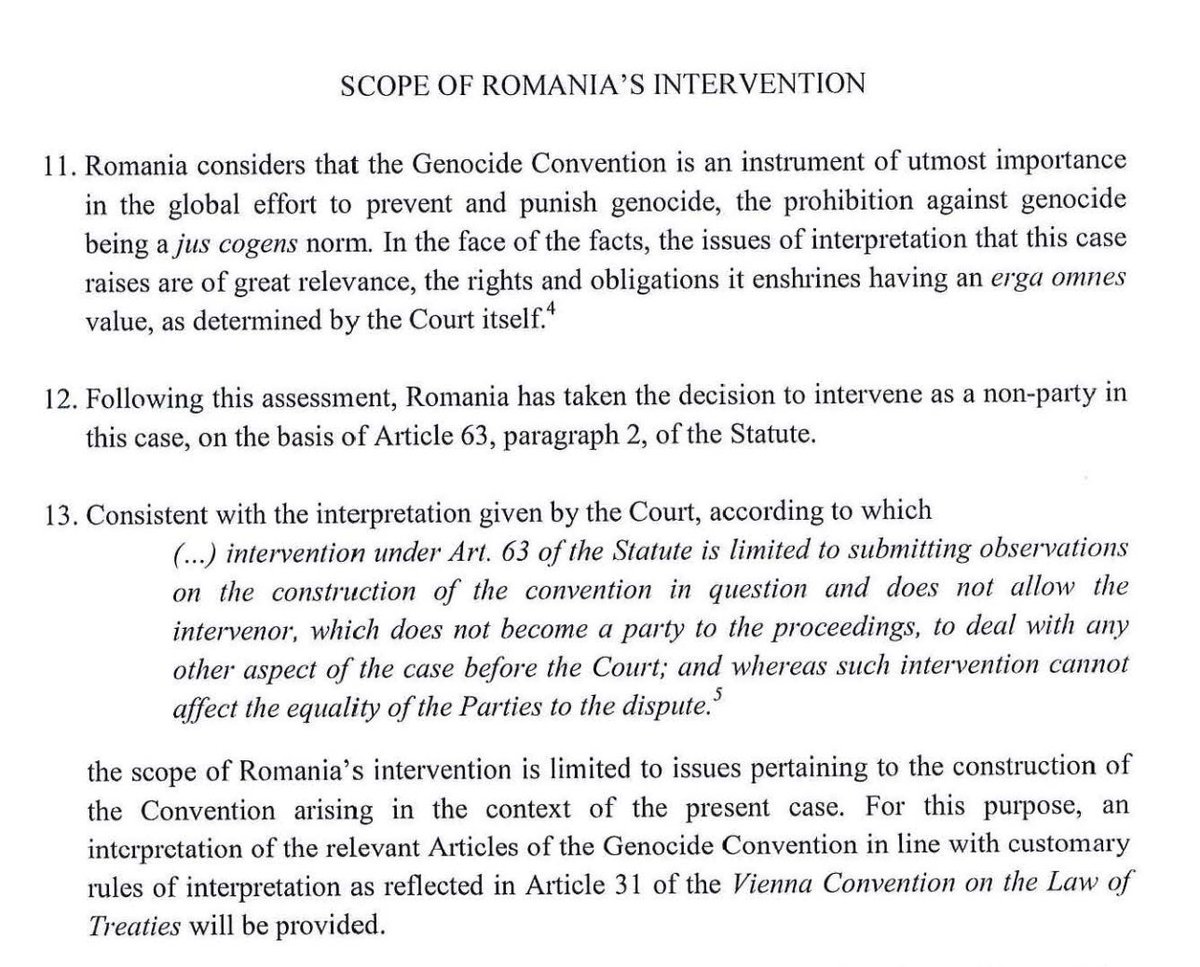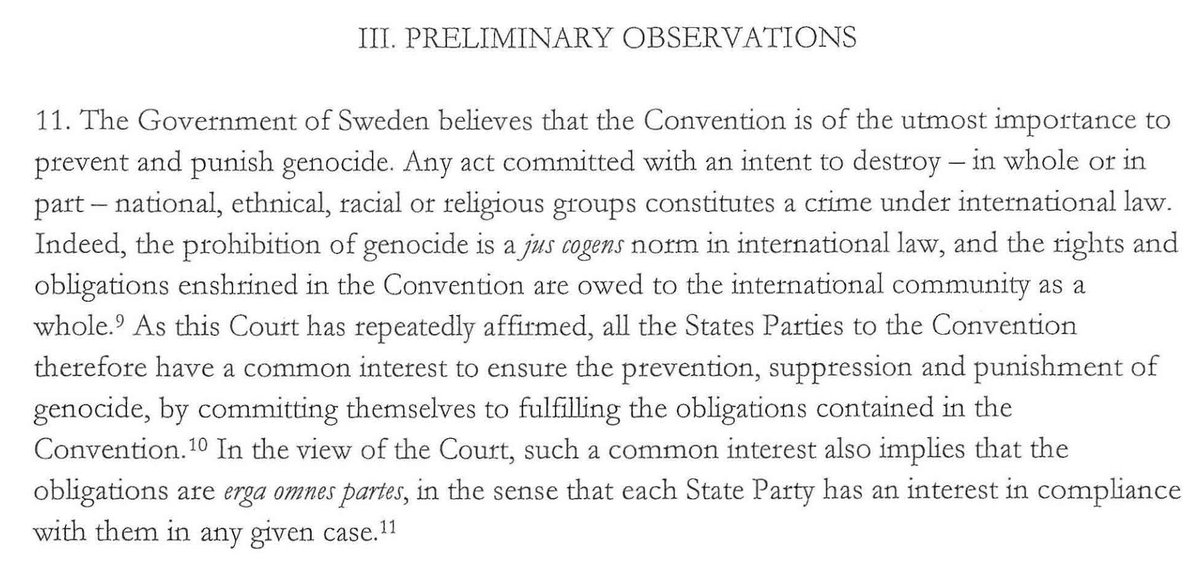#Finland's🇫🇮 and #Estonia's🇪🇪 respective declarations of intervention are now available on the #ICJ's website:
icj-cij.org/public/files/c…
icj-cij.org/public/files/c…
Observations🪡 #Ukraine #Russia 1/19
icj-cij.org/public/files/c…
icj-cij.org/public/files/c…
Observations🪡 #Ukraine #Russia 1/19
https://twitter.com/CIJ_ICJ/status/1572917825982840832
Both 🇫🇮🇪🇪 invoke their right of intervention under art 63 and the nature of obligations enshrined in Genocide Convention. 🇪🇪 also invokes J Cançado Trindade's opinion in Whaling case underlying importance of intervention for treaties where collective interests are concerned. 2/ 







🇫🇮🇪🇪 also consider capacity to intervene on jurisdictional issues, noting art 63 does not distinguish between different phases. They refer both to Judge Schwebel's opinion in the Nicaragua case and to leading treatises on the subject to justify intervention on such issues. 3/ 





As for provisions invoked upon which constructions will be offered, 🇫🇮 invokes "at least" art I, VIII, IX. 🇪🇪 adds to these art II-IV. Additionally, 🇪🇪 notes its willingness to assist the Court in "grouping" its intervention if useful for "expedient administration of justice". 4/ 





🇪🇪 divides its intervention between issues relating to jurisdiction and the merits, whereas 🇫🇮 considers the provisions it invokes chronologically. For practical reasons, 🇪🇪's structure will be followed below in overviewing both declarations. 5/
In interpreting art IX, 🇫🇮🇪🇪 both begin by defining concept of "dispute", both quoting from Mavrommatis, South West Africa, Qatar v UAE and Gambia v Myanmar.
Moving onto other elements of art IX, 🇫🇮 is more brief than 🇪🇪, though somewhat similar in structure. 6/

Moving onto other elements of art IX, 🇫🇮 is more brief than 🇪🇪, though somewhat similar in structure. 6/


🇫🇮 notes that the ordinary meaning and context of art IX connotes that jurisdiction is not confined to disputes over whether genocide has been committed, but also extends to good faith application, including unilateral use of force for preventing & punishing genocide. 7/ 

🇫🇮 also highlights "any party" formula in art IX, which it argues underlines that both the accusing and accused states may seise the Court. 8/ 

🇪🇪 elaborates on broad scope of art IX, highlighting language of "relating to" and "fulfilment", arguing ordinary meaning extends jurisdiction to good faith application, abuse of law, non-violations and unilateral use of force for preventing & punishing genocide. 8/ 

🇪🇪 similarly invokes the "any party" formula to justify jurisdiction extending to non-violation claims.
Finally, both 🇫🇮🇪🇪 invoke the Convention's object & purpose as justifying the extension of jurisdiction to alleged abuse of the Convention. 9/



Finally, both 🇫🇮🇪🇪 invoke the Convention's object & purpose as justifying the extension of jurisdiction to alleged abuse of the Convention. 9/




🇪🇪 makes similar argument to 🇸🇪🇵🇱 that ICJ may reject jurisdiction if not satisfied that genocide prima facie occurred.
This seems to undermine argument 🇺🇦 and interveners are making; otherwise conflates PM issues to those of jurisdiction for merits. 10/
This seems to undermine argument 🇺🇦 and interveners are making; otherwise conflates PM issues to those of jurisdiction for merits. 10/
https://twitter.com/OriPomson/status/1572238484655706118?s=20&t=08Hvwy3CkwQB6TpUWBBq4w

On the substantive provisions of the Convention, both 🇫🇮🇪🇪 underline that obligations to prevent and punish must be applied in good faith. They underline that prevention must be based on assessment with due diligence. 11/ 





In this regard, they refer to the @UN_HRC resolution on prevention of genocide and i.a. emphasise importance of findings of independent UN human rights investigations. 🇪🇪 adds that evidence of genocide or risk thereof must be fully conclusive for acting under art I. 12/
🇫🇮🇪🇪 refer to legality requirements in applying art I, but in different ways. 🇫🇮 refers to the 🇧🇦v🇷🇸 formula that prevention measures under art I are those in accordance with intl law, while further underlining that serious violations are not permitted under art I. 13/ 

🇪🇪, referring in particular to arts VIII and IX, argues that unilateral acts of prevention must be a last resort. Additionally, for 🇪🇪, otherwise unlawful measures cannot be taken if genocide or serious risk thereof has not been assessed properly. 14/ 

Both states (further) underline preference of the Convention for collective measures by reference to art VIII, with 🇪🇪 elaborating that unilateral extraterritorial measures of prevention cannot be taken under Convention without prior seising (and inaction) of competent organs.15/ 





🇫🇮🇪🇪 also consider meaning of "punishment" under Convention, both emphasising criminal law nature of such measures and that recourse to military force and "'punish[ing]' a State or a people" are not the form of "punishment envisioned. 16/ 





🇪🇪 seems to make argument setting the stage for finding that Russia is violating Convention in discussing art IX. It argues that Convention's "object to protect the most elementary principles of morality... prohibits any possibility... to abuse its provisions for other means".17/ 

To conclude, Finland's and Estonia's declarations make very similar arguments, even if Estonia's is somewhat more elaborative. At times the states even use the exact same phrases. 18/
What perhaps puts 🇪🇪 in a more exclusive group (with 🇱🇻🇱🇹🇵🇱🇩🇰🇮🇪?) is that it (precariously) makes way for the argument that Russia is in fact violating the Convention. 19/19
• • •
Missing some Tweet in this thread? You can try to
force a refresh






















